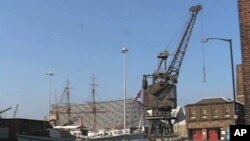For more than 400 years, the Chatham Dockyard was at the heart of British Maritime history. When it closed in 1984, thousands were put out of work and the dockyard fell into disuse. But now it is emerging as a tourist destination, an educational center and a hub for young entrepreneurs.
Britain's Royal Navy flourished here for nearly 400 years. At Chatham Dockyard in Southeastern England, ships were built and repaired and tradesmen crafted everything a naval or merchant vessel needed.
The site is now maintained by a historic trust. Retired Admiral Ian Garnett is at the helm.
"This is I think one of the jewels in the crown of Britain's maritime heritage. It is the best example of a dockyard from the age of sail anywhere in the world," said Garnett.
And history is everywhere.
The sloop HMS Gannet protected British trade routes and did anti-slavery patrol in the 19th century. It was built here.
Also on display, this World War II naval destroyer, getting a bit of a facelift. And there's the ropery in a building that's a half-kilometer long. It's been making rope since the 18th century and it's still at it today, selling its wares throughout the world.
"This is the longest working ropery around now,” noted Colin Parr who heads Master Ropemakers. “There are some shorter versions, but not able to make full-length ropes."
Britain's industrial revolution began in the royal dockyards. The earliest ships were built in open-air docks that were eventually covered. The giant shipbuilding sheds reflect the progress of the age, as wooden structures gave way to iron and steel ones. In all more than 500 ships were built here.
It takes about 5,000 trees to construct a ship like the Gannet. And when an old ship is renovated or decommissioned, the wooden planks are used elsewhere. Some of that recycled wood, including a piece from this ship, has ended up in the White House in Washington.
U.S. President Barack Obama sits at the Resolute Desk, a gift to America in 1880, made from old timbers in the Dockyard.
In 2009, it got a new accessory, a pen holder. It was made by Chris Jones, the dockyard's head of shipkeeping.
"We had this piece of timber sitting in the workshop that came from the ship when it was restored and it conveniently had a groove on one side that was kind of pen-shaped," said Jones.
The Dockyard closed in 1984, putting thousands out of work. But as a tourist and educational site there's been a revival.
"It's growing at a tremendous rate,” said Jones. “We have 400 people who live on site permanently, and a thousand people who work on businesses on site and that figure is growing all the time."
A submarine for the Canadian Navy was the last thing built here. It was launched in 1966.
Another is back at the Dockyard, being used for tours. Organizers here are bidding to be part of a United Nations World Heritage site. Rich with relics from the past, the Chatham Dockyard hopes it also has a bright future.




